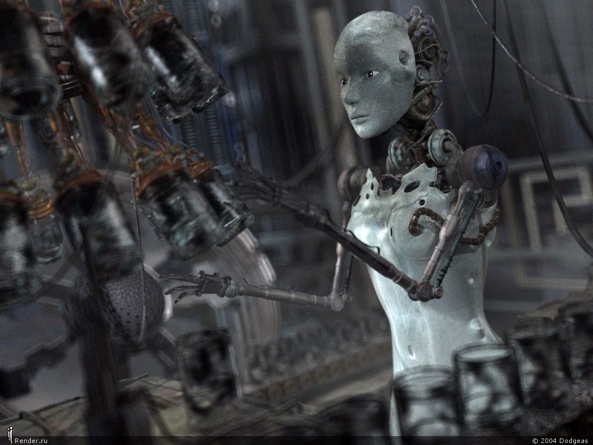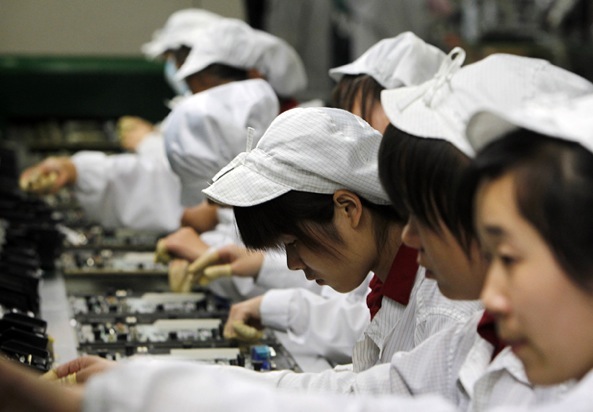Despite ongoing criticism of poor labor conditions at its factories (sometimes likened to sweatshops), especially following The New York Times’ iEconomy series, the world’s largest assembler of electronics Foxconn could still be interested in replacing some of its one million low-wage workers with advanced industrial robots. Such an unprecedented switch wouldn’t be without pitfalls. Robots promise to make gadget manufacturing faster, way more reliable and potentially cheaper, but also render a ton of human workers obsolete in the process…
Although Foxconn CEO Terry Gou said a year ago he planned to bring on up to a million industrial robots over the next three years, nothing’s happened yet. It doesn’t take a genius to figure out that replacing human workers with robots at a time when China’s economy is slowing down isn’t politically advisable, let alone in the 1.33 billion people country run by the Communist party.
But as big media continues attacking Foxconn over low pay, long hours and allegedly horrendous working conditions, the prospect of automated assembly lines at Foxconn factories is now being mulled again.
Christian Larson, reporting for Technology Review:
“Automation is the beginning of the end of the factory girl, and that’s a good thing,” says David Wolf, a Beijing-based strategic communications and IT analyst. Wolf, who has visited many Chinese factory floors, predicts an eventual labor shift similar to “the decline of seamstresses or the secretarial pool in America.”
And when robots take over manufacturing, Foxconn will be able to assemble gadgets more reliably while reducing cost of production. Automation also would help reduce the five days and 325 steps needed to assemble an iPad and help mitigate Foxconn’s PR nightmare as robots don’t commit suicide when loaded with immense pressure and can work 24/7.
It wasn’t immediately clear from the report what progress, if any, Foxconn has made since last year’s proclamation of adding a million robots to assembly lines inside of three years. Be that as it may, China is gearing up for the age of automated manufacturing.
According to the International Federation of Robotics (IFR), last year there was a 50 percent jump in purchases of advanced industrial robots by Chinese manufacturers.
And if this data point didn’t impress you, this will: IFR predicts that China will overtake Japan as the world’s largest market for industrial robots in just two years.
Conversely, it’s entirely conceivably that Foxconn is at the forefront of this revolution.
I found this bit interesting:
Since the announcement, Guo hasn’t offered more details, keeping observers guessing about whether Foxconn’s plans are real.
Trade groups also haven’t seen the huge orders for industrial robots that Foxconn would need, although some experts believe the company may be developing its own robots in house.
Keeping quiet is a smart move for it could give Foxconn a jump on competitors. Now, Foxconn is not an ordinary company.
This is the largest maker of electronics in the world, employing over a million teenage workers who hand-assemble everything from iPhones, iPads and Macs to PlayStation and Xbox consoles, Kindle e-readers and desktop computers for Dell, Hewlett-Packard and others.
It’s the largest private-sector employer in China and runs factories in China, Brazil, Europe, India, Malaysia and Mexico. It develops its own cutting-edge manufacturing processes and often pushes the envelope when it comes to new materials, assembly techniques and the remarkable precision of manufacturing.
So, if anyone is suited to make a jump into the 21st century and automate assembly of electronic devices just as car makers previously automated much of the production of automobiles, it’s gotta be Foxconn.
But with so many rural workers making a living by performing repetitive and precise tasks, again and again, I guess there’s a moral dimension to be considered here.
A theoretical fully automated assembly line in Shenzen that churns out iPads wouldn’t make much headlines in terms of horror stories about underpaid workers who jump out of factory windows. However, I’m sure media would find ways to make bigger messes by accusing Apple of denying people in China their right to work.
Wrapping up, no matter how you look at it, a million robots replacing migrant workers in China will make evening news when it happens. And as a ton of people lose their job, they aren’t going to be happy about it.
Did you see this coming? Is automation at the expense of people’s livelihood called progress? And wouldn’t global automation in the not-so-distant-future break the economy cycle? Granted, these are mindless jobs but even with upwards mobility taken into account, we won’t have jobs for everyone forever, right?

